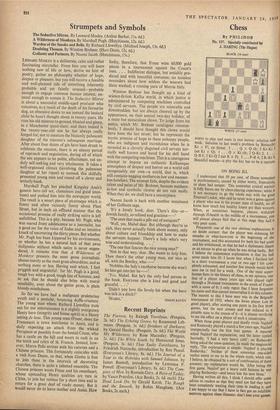Chess
By P,HILIDOR No. 137. Specially contributed by J. HARING (The Hague)
BLACK (10 men)
WHITE to play and mate in two moves: solution not week. Solution to last week's problem by Bottacchi: Kt x PI, no threat. 1 . . . Q x Q ch; 2 Kt-Kt I (set Kt x Q). 1 . . . Q x Kt ch; 2 Q-Kt 2. I . Q-B 8; 2 Kt-Q 2 (set R x P). 1 . P-B 4; 2 R-Kt 5. Beautiful mutate—a pity the key has to be a capture.
ON BEING ILL
I understand that 50 per cent. of illness nowadaYs is psychosomatic, caused by either worry, frustration, or sheer bad temper. This somewhat cynical statistic is fully borne out by chess-playing experience; while it is not necessary to go the whole way with the great Emanuel Lasker, who said he never won a game against a player who was in his proper state of health, we ail know how much less healthy losers are than winners. When, as sometimes happens, players withdraW through ill-health in the middle of a tournament, you will almost always find that at this stage they had a very poor score.
Frequently one of the two obvious explanations is no doubt correct: that the player was sickening for measles or what-have-you at the beginning of the tournament, and this accounted for both his bad score and his withdrawal, or that he had a diplomatic illness as an excuse to give up when he was doing badly. But I believe the commonest explanation is that his bad score made him ill: I know that when I finished last in a short tournament a year or two ago I felt com- pletely exhausted, and another few rounds would have seen me in bed for a week. One of the most super- human feats in the history of chess, in my opinion, was that of a player many years ago who played right through a 26-round tournament in the south of France with a score of 0; I only regret that I have forgotten his name and thus cannot immortalise it in this column. The nearest to this I have seen was in the Belgrade tournament of 1952, where the Swiss player Lob (a good player), after scoring one point in his first three games, lost the next sixteen and was reduced to a pitiable state in the course of it—it is almost terrifying to see the effect on a player of such a catastrophe. When those great players and deadly rivals Najdorf and Reshevsky played a match a few years ago, Najdorf unexpectedly lost the first four games. A reporter asked Najdorf the explanation, and the latter replied hurriedly, 'I had a very heavy cold'; on Reshevsky being asked the same question, he made the magisterial reply, 'The explanation is simple: Najdorf is playing Reshevsky.' Neither of these somewhat one-sided replies seems to me to be the whole truth, which can, I believe, be obtained by a sort of combination of these answers: my explanation would be, 'After losing the first game, Najdorf got a heavy cold because he was playing Reshevsky—and hence lost the next three.'
Having written all this, I think I should offer some advice to readers so that they need not feel they have been completely wasting their time in reading it, and I am happy to say that I have in fact got an infallible nostrum against chess illnesses: don't lose your games.
WHITE (11 men)


































 Previous page
Previous page